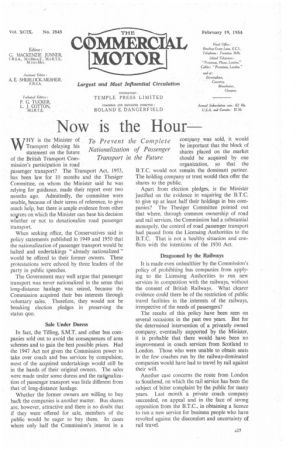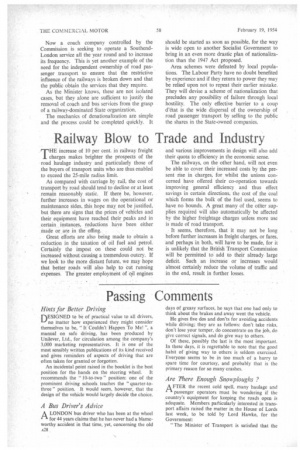Now •is the Hour
Page 29

Page 30

If you've noticed an error in this article please click here to report it so we can fix it.
WHY is the Minister of Transport delaying his statement on the future of the British Transport Commission's participation in road passenger transport? The Transport Act, 1953, has been law for 10 months and the Thesiger Committee, on whom the Minister said he was relying for guidance, made their report over two months ago. Admittedly, the committee were unable. because of their terms of reference, to give much help, but there is ample evidence from other sources on which the Minister can base his decision whether or not to denationalize road passenger transport.
When seeking office, the Conservatives said in policy statements published in 1949 and 1950 that the nationalization of passenger transport would be halted and undertakings "already nationalized" would be offered to their former owners. These protestations were echoed by three leaders of the party in public speeches.
The Government may well argue that passenger transport was never nationalized in the sense that long-distance haulage was seized, because the Commission acquired their bus interests through voluntary sales, Therefore, they would not be breaking election pledges in preserving the status quo.
Transport in
Sale Under Duress In fact, the Tilling, S.M.T. and other bus companies sold out to avoid the consequences of area schemes and to gain the best possible prices. Had the 1947 Act not given the Commission power to take over coach and bus services by compulsion. most of the acquired undertakings would still be in the hands of their original owners. The sales were made under some duress and the natignalization of passenger transport was little different from that of long-distance haulage.
Whether the former owners are willing to buy back the companies is another matter. Bus shares are, however, attractive and there is no doubt that if they were offered for sale, members of the public would be eager to buy them. In cases where only half the Commission's interest in a company was sold, it would be important that the block of shares placed on the market should be acquired by one organization, so that the B.T.C. would not remain the dominant partner. The holding company or trust would then offer the shares to the public.
Apart from election pledges, is the Minister justified on the evidence in requiring the B.T.C. to give up at least half their holdings in bus companies? The Thesiger Committee pointed out that where, through common ownership of road and rail services, the Commission had a substantial monopoly, the control of road passenger transport had passed from the Licensing Authorities to the B.T.C. That is not a healthy situation and conflicts with the intentions of the 1930 Act.
the Complete of Passenger the Future
Dragooned by the Railways It is made even unhealthier by the Commission's policy of prohibiting bus companies from applying to the Licensing Authorities to run new services in competition with the railways, without the consent of British Railways. What clearer evidence could there be of the restriction of public travel facilities in the interests of the railways, irrespective of the needs of passengers?
The results of this policy have been seen on several occasions in the past two years. But for the determined intervention of a privately owned company, eventually supported by the Minister, it is probable that there would have been no improvement in coach services from Scotland to London. Those who were unable to obtain seats in the few coaches run by the railway-dominated companies would have had to travel by rail against their will.
Another case concerns the route from London to Southend, on which the rail service has been the subject of bitter complaint by the public for many years. Last month a private coach company succeeded, on appeal and in the face of strong opposition from the B.T.C., in obtaining a licence to run a new service for business people who have revolted against the discomfort and uncertainty of rail travel. Now a coach company controlled by the Commission is seeking to operate a SouthendLondon service all the year round and to increase its frequency. This is yet another example of the need for the independent ownership of road passenger transport to ensure that the restrictive influence of the railways is broken down and that the public obtain the services that they require.
As the Minister knows, these are not isolated cases, but they alone are sufficient to justify the removal of coach and bus services from the grasp of a railway-dominated State organization, The mechanics of denationalization are simple and the process could be completed quickly. It should be started as soon as possible, for the way is wide open to another Socialist Government to bring in an even more drastic plan of nationalization than the 1947 Act proposed.
Area schemes were defeated by local populations. The Labour Party have no doubt benefited by experience and if they return to power they may be relied upon not to repeat their earlier mistake. They will devise a scheme of nationalization that precludes any possibility of failure through local hostility. The only effective barrier to a coup d'aat is the wide dispersal of the ownership of road passenger transport by selling to the public the shares in the State-owned companies.




























































































